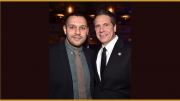 By: Paul P. Jesep*/TRT Columnist—
By: Paul P. Jesep*/TRT Columnist—
In late January, I had the opportunity to twice attend Holy Eucharist at Saint Bartholomew’s Episcopal Church in New York City on Park Avenue. I always try to spend time at St. Bart’s when in New York, whether for Eucharist, evening prayer or to sit quietly in a side chapel with its large Eastern Orthodox icon of the Blessed Mother. Fr. Edward Sunderland, LCSW celebrated both Eucharist liturgies. In one, he shared a sermon reminding everyone of the many aspects of faith. Although there were several lessons to take away from each sermon, two themes still resonate weeks later. I don’t recall if they came from one sermon or if I’m mixing them together like a fine recipe.
“Faith is a conversation about possibilities,” he said. It draws us to “open space for people we hate.” Conversations use words and these expressions of language can free and empower. You can’t transform someone’s negative energy if you’re unwilling to engage.
In further reflecting on Fr. Edward’s lessons, we need to welcome people to our table who seek us harm and try to be patient with the demons limiting them, though they are sometimes projected and unleashed on us. Mustering the courage and patience to find a place for haters and bigots enables us to help them by slowly re-directing their negative energy into goodness. [pullquote]When was the last time you wrote the name of a waiter or waitress on a restaurant check and noted the outstanding service? When was the last time you left a tip in a hotel room for the cleaning staff (who do not make a living wage), and wrote a short note thanking them for their work? [/pullquote]
It can be an exhausting, emotionally draining endeavor. In doing so, however, we open space for, as Fr. Edward noted, “the God we can’t see.” We encounter the Giver of Life’s presence through our own positive actions assisting others to heal and be true to their Creation as the Creator intended.
Fr. Edward referred to the rock star popularity of Pope Francis. He cautioned not to emulate others. He challenged worshipers to be their own light in the world to love more, judge less and build a more inclusive community.
All of us have the potential within to be a holy light. “A lamp is placed on a lampstand,” the Bible teaches, “where it can give light to everyone in the house. Make your light shine, so that others will see the good that you do and will praise God in heaven” (Matthew 5:15-16).
It’s okay to be inspired by someone or encouraged by their example. Ultimately, each one of us is called to project our own light and empower those who are angry, alone, hateful, fearful, insecure, unappreciated, or under stress. When was the last time you paid a colleague at work a compliment, especially one difficult to like? When was the last time you wrote the name of a waiter or waitress on a restaurant check and noted the outstanding service? When was the last time you left a tip in a hotel room for the cleaning staff (who do not make a living wage), and wrote a short note thanking them for their work?
In many ways, these are opportunities to explore faith, whether trying to understand the bigot or connecting with a waiter we may never see again. It speaks to our personhood and also to the humanity of the individual with whom we seek to engage at some basic level.
Faith is a positive conversation no matter the other person’s politics, religion, education, or whether they cheer for the Yankees or Red Sox.
*Paul is an author, attorney and a seminary trained, ordained priest in greater Albany, NY. He is founder of CorporateChaplaincy.biz, a firm committed to the spiritual wellness of professionals.







